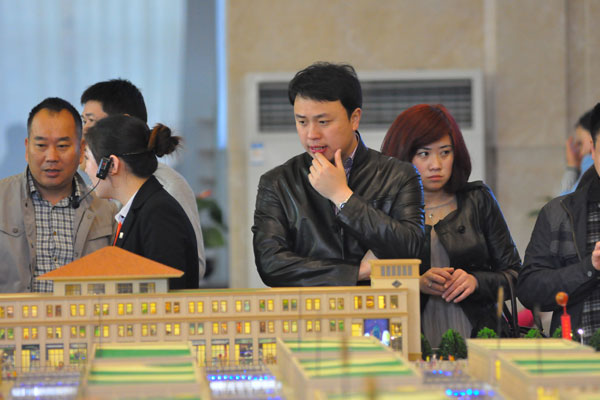|
 |
|
A man inspects a property model display on June 14, 2014 in Rizhao, Shandong province. [File photo/provided to China Daily] |
If you have accumulated some cash and feel rich after the value of your small, starter home has appreciated by four or five times in less than a decade, would you consider moving up the housing ladder to own a larger and nicer home?
In Beijing, small homes with a size of less than 90 square meters account for 50 to 70 percent of those sold since 2006, when the government imposed a home-building ratio in favor of low-income families.
Now, many such families want to upgrade as they have outgrown their first homes since their children have grown up and their financial positions have improved.
Yet until recently, most would-be second-steppers had chosen to wait on the sidelines in anticipation of price falls at a time when housing sales were hit by the last round of cooling measures and the supply of bigger homes outstripped demand.
However, the tide seems to have turned since March when, as a way to boost the slowing economy, the government relaxed some housing curbs in favor of up-graders. The new measures include easier access to a mortgage, lower transaction tax and a cut in the minimum down payment to 40 percent from the previous 60 to 70 percent.
The market rebooted after a lifeless lull upon the loosening of controls. Some real estate agents claimed they had worked round the clock to close deals. Banks were ready to receive crowds of up-graders who were considered premium customers as a big home on the city fringe could cost between 4 million yuan ($653,838) and 10 million yuan.
Some second-steppers were prompted to take the plunge, partly by the fact that the policy shift has reinforced the popular belief that housing prices will not fall in the Chinese capital. Instead, after each short, slight dip due to cooling measures, prices rebounded with a vengeance, leaving the non-believers cursing their gullibility and slow moves.
But the initial euphoria lasted only several days and the expected rush to buy a dream second home has not materialized. People who are on their second home have proved to be much more discerning and prudent than first-time buyers, and they tend to think along the lines of "new normal" when making a major financial decision.
Instead, homebuyers, policy-makers and real estate developers seem to be locked in a little mind game as they try to figure out each other's bargaining power.
It is true that many residents have outgrown their first flats and they fear housing prices may continue to rise with lower interest rates and excess liquidity, unleashing buyers' pent-up demand for nicer and better-located homes.
But the general consensus is that the "golden age" for real estate development, characterized by soaring prices and profits, is already over, given the country's wide homeownership and changing demographics. Most projects have not raised their prices after the new eased rules and developers have been bent on clearing their house stocks. Developers have been worried about intensifying competition as the local market is expecting an influx of new high-end apartment projects and villa developments this year.
While encouraging homebuyers to spend more to help boost the economy, the government has not lifted key cooling measures, including a ban on third-home purchases in major cities and levying capital gains tax, as it continues to be wary of a frothy real estate market driven by speculators. Foreigners can buy a house only if they work for a year or longer in China.
It is generally expected that more incentives will be given to invigorate the real estate sector if the current ones do not work out in the rest of the year. Cash is king and for the first time, buyers have the upper hand.
